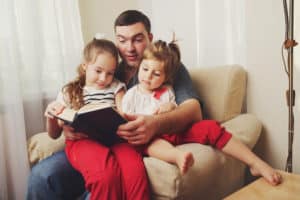Once you enter the adoption world, it’s common to stay connected with those who have journeyed with you or have journeyed through it themselves. Deeanna became one of my best friends, and we were in touch with her regularly. We tried to help with her desire to educate other prospective adoptive parents and support those who’d already adopted. This was Deeanna’s passion and calling in life.
A key part of that calling was to help provide the very specialized training and support these adoptive families would need to effectively parent their hurting and challenging children. To accomplish this, Deeanna would occasionally invite experts from the U.S. mainland to come to Hawaii to provide training for families.
On one such occasion, a woman who had successfully parented many incredibly challenging, even violent, children came to the island to encourage and train adoptive families. She wasn’t a medical doctor, psychologist or psychiatrist, but as an adoptive parent, she’d lived through the joys and traumas, rather than just watching others do it. In the process, she had learned some incredibly important lessons the hard way.
Our informal network of adoptive families took turns hosting her for meals, and John and I were scheduled to take her to lunch one Sunday afternoon. We were tired and really, really, really didn’t want to do it. But it was one of those times when we needed to keep our commitment no matter how we felt.
Of course, our precious Daniel was with us, and he sat on my lap holding his bottle while John and I chatted with the woman about our experiences to date.
She asked me how long Daniel had been holding his own bottle.
“Awhile, I guess,” I said proudly. I went on to say how great this was, especially since he’d had some developmental delays.
Then I explained that Daniel had finally become more independent and would do things on his own, which was such a relief after having to hold him constantly. Since the woman was an expert on adoption, I went on to tell her about Daniel’s background and how the drugs and alcohol in utero made him extra sensitive to touch. I also mentioned that his foster mom didn’t touch him very much because it made him scream, and who wants to make a baby scream?
She looked quite serious, as if something was really wrong, and continued to ask me questions.
“Does he look back and check in with you when he crawls to touch something?” she wanted to know.
“Not really,” I said.
“Does he turn to show you something new he’s discovered?” she continued.
“No, not really. He’s gotten very independent, and it’s a lot easier this way,” I replied.
After a few more questions and a few more answers, she finally said, “You folks are headed for trouble.”
I had a sick feeling in the pit of my stomach. She went on to tell us that those symptoms indicated that Daniel wasn’t appropriately attached to us, and because of what he’d been through, he might have an attachment deficit.
Attachment deficit? As in the reactive attachment disorder? Pure panic set it.
“Don’t worry,” she said. “He’s young enough that you can help him become securely attached fairly easily. You’ll have to therapeutically parent him, though.”
What in the world did that mean?
She went on to give us advice that would have sounded like psychobabble had we not seen attachment problems up close and personal.
She said that only John and I should hold Daniel, and that only I should feed him (not even John!). She told us that we should never let him hold his own bottle; he needed to depend on me to provide him with what he needed. He needed to be able to bond with and trust me. And then came the kicker: I needed to hold him and be face-to-face with him for almost eight hours a day!
My first thought was, Are you kidding me?
How in the world was I supposed to hold him for eight hours a day? We’d soon find out. We left the restaurant that day feeling unsettled and upset. In fact, I was gripped with fear and sick to my stomach. It’s hard to describe the dark cloud of dread that enveloped us. We prayed and reminded ourselves that Daniel was still young. We could fix this.
The truth is that God did a great thing for us that day. He reminded us what happens to kids when they don’t get the kind of start in life that He wants them to have.
It seemed like crazy advice that would only make our life harder in the short term. Instead, by God’s grace, we took this woman’s words very seriously. It was hard, but it was doable. We did what she said. Honestly, we were scared not to. I finally discovered the miracle of the baby sling, so at least I had my arms. And after several months of this therapeutic parenting, we saw a difference. Daniel began to make good eye contact, and he was much healthier emotionally, more engaged and more connected to us. He checked in with us if he were on a mission to do something. He shared his new-toy joy with us as he made new discoveries.
I still had to battle reasonable and unreasonable fears – reasonable fears that we’d not done enough to help Daniel become emotionally healthy, and unreasonable fears that at any moment he’d suddenly detach from us. John and I alternated the roles of worrier and assurer, and back and forth we went, supporting each other through the fear along the way.





















